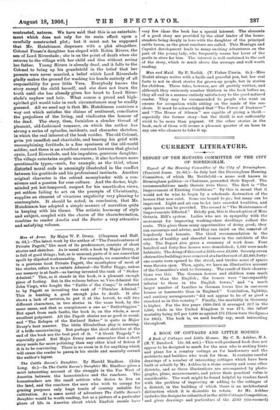C URRENT LITERATURE.
REPORT OF THE HOUSING COMMITTEE OF THE CITY OF BIRMINGHAM.
Report of the Housing Committee of the City of Birmingham. (Percival Jones. 2s. 6d.)—In July last the Birmingham Housing Committee, of which Mr. Nettlefold—a name well known in Birmingham politics—is Chairman, presented their Report. The recommendations made therein were three. The first is "The Improvement of Existing Conditions." By this is meant that it would not be wise to begin by a wholesale destruction of the houses that now exist. Some are bound to go ; but many can be improved. Light and air can be let into crowded localities, and open spaces can be provided. The second is "The Maintenance of Improvements Effected." Briefly put, this is the adoption of Miss Octavio Hill's system. Ladies who are in sympathy with the movement for improving working-class dwellings collect the rents. This gives them many opportunities of doing good; they can encourage and advise, and they can insist on the removal of hopelessly bad tenants. The third recommendation is the erection of healthy and cheerful houses in the outskirts of the city. Tho Report also gives a summary of work done. Four hundred and forty-five houses were demolished; 1,132 were made habitable. The doing of this cost a little over .83,000. Seventy-seven obstructive buildings were removed at a further cost of 42,440, forty- one courts were opened to the street, and twelve acres of spaces were thrown open. Then, again, we have an illustrative account of the Committee's visit to Germany. The result of their observa- tions was this. The German houses and children were much cleaner than the English ; the houses were " incomparably inferior to those in the English towns," and "a much larger number of families in German towns live in one-room houses or tenements than in England." Ventilation, lighting, and sanitary arrangements "did not appear to be of as good a standard as in this country." Finally, the mortality in Germany is higher. For the five years 1899-1903 it averaged 201 in the 1,000, while in the United Kingdom it was 17.1, the infant mortality being 207 per 1,000 as against 151 (these were the figures for 1901). The book is, we need hardly say, most interesting throughout.


































 Previous page
Previous page